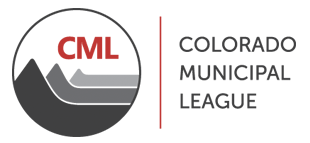CML 2025 Legislative Priorities
During the 2025 Colorado General Assembly legislative session, CML expects to see a range of policy proposals and priorities that will have a direct impact on local governments across the state. With a continued focus on affordability, sustainability, taxation and criminal justice, municipalities should prepare for discussions on critical issues such as housing affordability, transportation infrastructure, climate resilience, municipal court sentencing and local revenue mechanisms.
The budget is expected to take center stage during the Colorado legislative session, as the Joint Budget Committee (JBC) grapples with the arduous task of cutting millions of dollars from the state budget, lawmakers will face critical decisions on funding priorities and the allocation of resources across a range of programs. Given the complexity of the fiscal landscape, CML will be closely monitoring the JBC’s recommendations, as cuts to state programs often have direct impacts on local funding, and to ensure that fiscal burdens are not shifted to the local level.
With the outcome of the 2024 elections shaping the legislative landscape, this session may bring shifts in party dynamics and policy direction that will impact they type of legislation we see. CML will be keeping a close watch on emerging legislation and will be poised to advance the interests of municipalities across the state.
The CML Policy Committee met in October and December of 2024 and will meet again in January, February, and March of 2025. All recommendations of the Policy Committee are reviewed and approved by the CML Executive Board.
Below are CML’s specific legislative priorities going into the 2025 Legislative Session.
In This Section
AFFORDABLE HOUSING
The availability and affordability of housing is of utmost concern to Colorado’s municipalities. CML supports state incentives that support communities’ efforts to build affordable housing and appropriate state assistance in strategic planning. CML supports the state addressing construction defects litigation reform to increase the availability of affordable housing. CML opposes state preemption of local authority to adopt and enforce zoning and land use ordinances and any interference with home rule authority granted by Art. XX, S. 6 of the Colorado Constitution. CML supports protecting municipal authority to establish and enforce permitting processes, including those that apply to housing development.
CML supports legislation that gives municipalities the tools to address repeat offenders who are released on Personal Recognizance (PR) bonds and fail to appear in court, as municipalities across the state have seen a rise in petty and misdemeanor crimes. CML supports programs that increase access to the right to counsel for people facing jail sentences. CML supports protecting municipal authority to address alleged police misconduct. CML opposes prescriptive mandates on police and court operations, the expansion or removal of liability caps and legislation that would require municipal sentencing to mirror state court limits.
CML supports measures that promote intergovernmental cooperation on land use issues and supports state laws and policies that encourage new residential, commercial, and industrial development to occur within existing municipalities. CML supports the prohibition of the incorporation of new cities and towns adjacent to, or within the service areas of, existing municipalities. CML opposes efforts to restrict municipal annexation authority.
TAXATION
CML supports the state extending excise taxing authority to statutory municipalities as a means of generating revenue to address local concerns and fund essential public services. Additionally, CML supports explicit state authorization allowing statutory municipalities the option to levy a vacancy tax with the approval of the voters.
CML supports state funding for transportation system infrastructure improvements that seek to prevent vehicular collisions with vulnerable road users. CML opposes “off-the-top” diversions from the Highway Users Tax Fund (HUTF) and further opposes efforts to alter HUTF allocations that result in reduced funding for local governments to invest in roads and bridges. CML supports state efforts to improve the safety and reliability of public transportation through investment of state and federal funds. CML opposes state preemption of municipal authority for transportation planning at the local level.
CML opposes state statutes that violate the state’s unfunded mandate statute, as well as the prohibition on unfunded mandates in the Taxpayers Bill of Rights (TABOR), and place additional fiscal burdens on local governments and their taxpayers.
CML opposes cuts to the state budget that disproportionately impact municipalities, as these reductions threaten vital services and programs that municipalities rely on to serve their communities. CML opposes the sweeping of severance tax revenue—funds that were intended to support municipalities impacted by energy development—into the state’s general fund or for any other purpose.
CML opposes legislation that attempts to increase liability for municipalities through either expansion of private rights of action, removal of caps or limits on damages, or removal of remedies provisions in law. Increased liability places an undue financial burden on local governments which could divert limited resources away from critical public services and undermine the ability to serve communities effectively. Exposure to excessive liability could lead to higher insurance premiums, which would further strain public finances and could result in cuts to essential programs like public safety, infrastructure, and community services.
